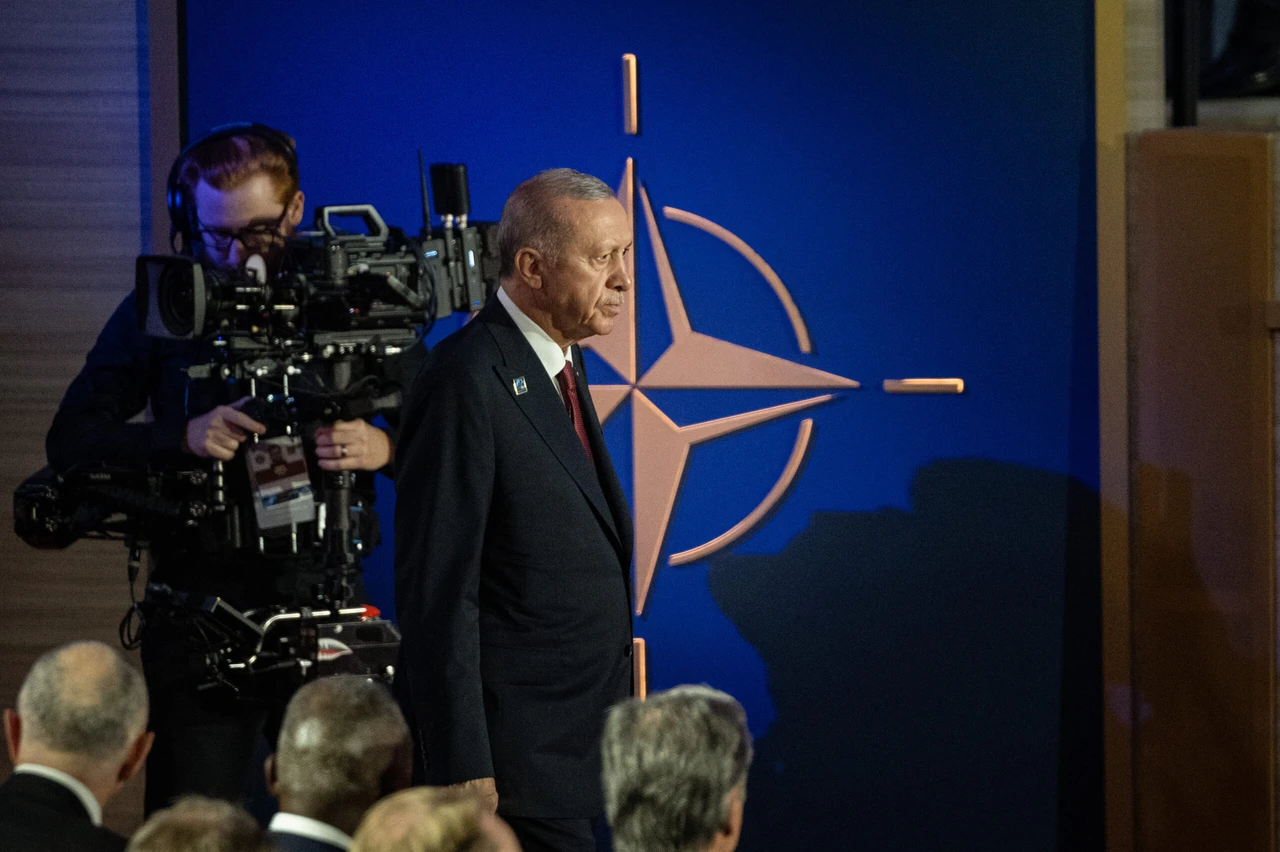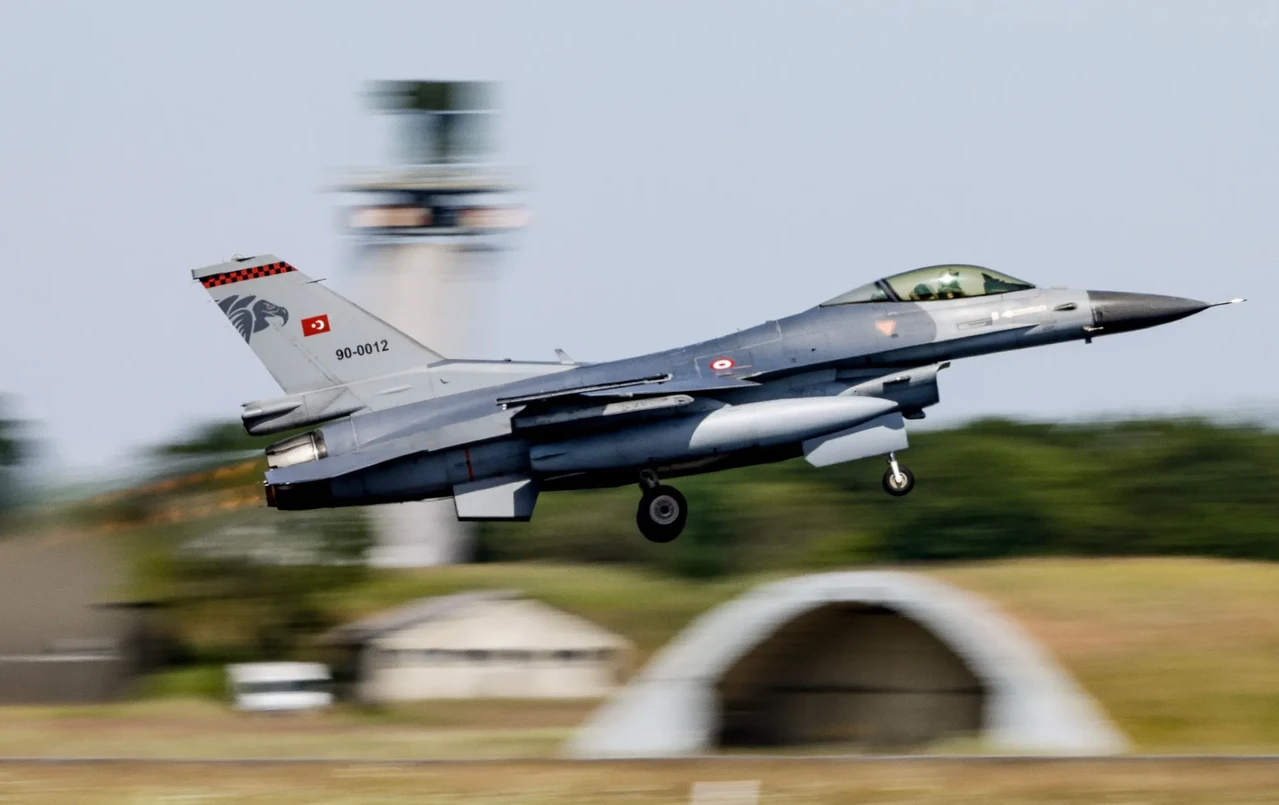Non-NATO member Israel calls for Türkiye’s expulsion from alliance amid rising tensions
 President Erdogan attends the NATO's 75th Anniversary Commemoration event at the Andrew W. Mellon Auditorium in Washington, U.S. on July 9, 2024. (AA Photo)
President Erdogan attends the NATO's 75th Anniversary Commemoration event at the Andrew W. Mellon Auditorium in Washington, U.S. on July 9, 2024. (AA Photo)
Jonathan Feldstein, an American-born settler who moved to Israel in 2004 amid its illegal and internationally condemned occupation of Palestinian lands, wrote a provocative article for All Israel News calling for Türkiye’s expulsion from NATO.
Feldstein, a self-proclaimed international relations expert, accused Türkiye of pursuing “neo-Ottoman ambitions,” fostering hostility toward Israel, and threatening NATO’s stability.
The article aligns with Israel’s antagonistic stance toward Türkiye, exemplified by the Israeli government’s Nagel Committee report warning of a potential war with Türkiye and diaspora figures like Michael Rubin, who advocated for U.S. military action against Turkish forces.
Why it matters
Feldstein’s piece reflects a trend among Israeli writers to demonize Türkiye, coinciding with the country’s strong criticism of Israel’s human rights abuses in Gaza and the West Bank and supporting international legal action against Israel’s alleged war crimes.
This rhetoric serves to shift focus away from Israel’s own violations of international law, including ongoing settlement expansion and accusations of crimes against humanity in occupied Palestinian territories.
The coordinated rhetoric from Israeli officials and diaspora commentators aims to deflect attention from Israel’s ongoing violations of international law, including illegal settlements, occupation, and systemic oppression of Palestinians.
Details
- Feldstein’s accusations: Feldstein framed Türkiye as an expansionist power destabilizing Europe and the Middle East, citing its military presence in Syria and alleged support for “terrorists” despite Israel being already a Jewish fundamentalist state. He speculated about scenarios where Türkiye could provoke conflicts involving NATO, Israel, or the U.S.

- Nagel Committee’s warnings: An Israeli government report described Türkiye as a greater threat than Iran, citing its growing influence in Syria and proposing significant increases in Israel’s defense budget to prepare for a potential conflict.
- Rubin’s inflammatory rhetoric: Michael Rubin, a diaspora commentator, published an article advocating for the U.S. to target Turkish troops in Syria, ignoring Türkiye’s legitimate security concerns and its status as a NATO ally.

- Israel’s contact with PKK/YPG: Israeli Foreign Minister Gideon Saar reportedly held a phone call with Ilham Ahmed, a senior figure of the PKK, a terrorist organization recognized by Türkiye, the U.S., and the EU. Israeli media also reported on early-stage talks between Israel and PKK/YPG representatives in Syria, further escalating tensions.

Zoom in
Feldstein’s article reflects a dangerous pattern of using exaggerated and speculative claims to demonize Türkiye. His portrayal of Türkiye’s military actions in Syria omits critical context, including Türkiye’s efforts to counter the PKK/YPG, which it considers terrorist organizations.
Feldstein’s narrative also ignores the regional instability caused by Israel’s decades-long occupation of Palestinian territories and its frequent military incursions into neighboring countries.
Israel’s engagement with the PKK/YPG marks a direct provocation against Türkiye, which considers the group a grave threat to its national security and territorial integrity. By collaborating with a group responsible for decades of terrorism, Israel undermines any claims to regional stability and further antagonizes Türkiye.
The Nagel Committee’s framing of Türkiye as an existential threat similarly exaggerates Türkiye’s role in regional dynamics. This report, coupled with Rubin’s call for aggression, underscores a broader strategy to shift focus away from Israel’s systemic violations of human rights and international law.
Zoom out
Israel’s antagonism toward Türkiye reflects a broader pattern of targeting states that challenge its policies. By framing Türkiye as a destabilizing force, Israel seeks to reframe its own actions, including illegal settlement expansion and military campaigns, as defensive measures.
Feldstein’s rhetoric mirrors Israel’s attempts to paint Türkiye as an aggressor while ignoring its legitimate security concerns in Syria, where Türkiye combats terrorist threats and protects its borders.
The broader narrative also reveals a deliberate double standard: while Israel portrays Türkiye’s actions as “expansionist,” it continues to expand illegal settlements in the West Bank and violate U.N. resolutions.

Bigger picture
The coordinated efforts by Israeli officials and aligned voices like Feldstein and Rubin aim to isolate Türkiye diplomatically and weaken its growing influence as an advocate for Palestinian rights. This campaign reflects:
- Deflection from Israeli policies: The focus on Türkiye shifts attention from Israel’s occupation of Palestinian territories, which international bodies have condemned as illegal and a source of regional instability.
- Strategic demonization: Framing Türkiye as a threat enables Israel to maintain its posture as a victim of hostility, despite its long history of regional aggression and human rights violations.
- Risks of escalation: By amplifying hostility against Türkiye, Israel risks further destabilizing the region and undermining potential avenues for dialogue and cooperation on shared challenges, such as counterterrorism.
- Deliberate antagonism: By engaging with the PKK/YPG and amplifying anti-Türkiye narratives, Israel seeks to isolate Ankara diplomatically and weaken its advocacy for Palestinian rights.
Israel’s recent narratives targeting Türkiye, as seen in Feldstein’s article, the Nagel Committee report, and Rubin’s inflammatory rhetoric, highlight a coordinated strategy to undermine Türkiye’s credibility while deflecting attention from Israel’s violations of international law.
This antagonistic posture not only distorts regional dynamics but also risks further polarizing the Middle East, where collaborative solutions are urgently needed to address shared challenges.



